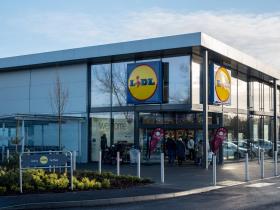More than 63% of households visited at least one of the German discount chains over the past 12 weeks
Discount chains Aldi and Lidl boosted their market share to new record highs of 7.3 per cent and 5.3 per cent respectively in the last quarter, new figures show.
Sainsbury's and Asda both lost ground to the German challengers as competition in the grocery sector remains fierce.
Sales rose 2.5 per cent across the sector in the last quarter despite the travel chaos caused by the Beast from the East keeping some shoppers at home.
- Read more
Lidl vows to crack down on plastic waste by eliminating 5p bags
An earlier Easter this year compared to 2017 motivated consumers into starting their Easter weekend shopping in March, largely counteracting the hit to demand caused by severe weather in February and March, the latest figures from Kantar Worldpanel suggest.
Sales of Easter eggs were particularly buoyant, with a 69 per cent rise in the 12 weeks to March compared to the same period last year, despite average prices jumping by 35p to £1.83, Kantar said.
In the run up to and during the cold snap, shoppers stockpiled groceries buying 4 per cent more items than normal, increasing the average value of a trip from £14.99 to £15.80, Kantar said. Customers who braved the snowy weather bought 8.4 per cent more hot beverages and 27.5 per cent more tinned soup in March.
Tesco’s sales rose 2.4 per cent to keep its market share steady at 27.6 per cent as it attracted an additional 262,000 customers through its doors. Morrison’s also increased sales by 2.4 per cent to keep its market share at 10.4 per cent.
Growth at the retailer was helped by a strong performance in online sales, with Morrison’s e-commerce offering proving particularly popular among younger, more affluent shoppers.
Asda’s market share continued to decline, slipping by 0.2 percentage points to 15.6 per cent. Sainsbury’s also saw market share drop – down 0.3 percentage points to 15.8 per cent.
Read more
- Tesco and Morrisons fastest growing big supermarkets, data shows
- Nine arrested after looters smash digger into Lidl supermarket
- Waitrose's avocado-shaped Easter Eggs sell out
- Here are Godiva's limited edition Easter eggs
Co-op saw sales increase by 0.1 per cent, with the disposal of 300 stores to McColl’s no longer impacting performance. Waitrose also experienced sales growth – up 1.5 per cent year-on-year – while its market share fell by 0.1 percentage points to 5.0 per cent. After two years of continuous growth, Iceland saw sales fall by 0.8 per cent over the past 12 weeks and dropped market share to 2.1 per cent.
Fraser McKevitt, head of retail and consumer insight at Kantar, said the figures showed that Aldi and Lidl were continuing to disrupt the groceries market.
"As the discounters proceed with the expansion of their store portfolios, over the past 12 weeks 63.5 per cent of all households visited at least one of the retailers.”
Matthew Barnes, chief executive of Aldi UK & Ireland, said he was delighted at the new record market share figures.
“Our strong sales growth during this period was due, in part, to a stand-out Mother’s Day, which saw record sales for a single day outside of the Christmas period," he said.
- More about:
- Supermarkets
- groceries
- ALDI
- Lidl
- Tesco
- Sainsbury's
- Kantar Worldpanel
 Reuse contentRead the Original Article
Reuse contentRead the Original Article




























